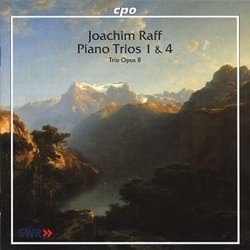| All Artists: Joachim Raff, Trio Opus 8 Title: Joachim Raff: Piano Trios 1 & 4 Members Wishing: 1 Total Copies: 0 Label: Cpo Records Release Date: 6/19/2001 Genre: Classical Styles: Chamber Music, Historical Periods, Classical (c.1770-1830) Number of Discs: 1 SwapaCD Credits: 1 UPC: 761203961627 |
Search - Joachim Raff, Trio Opus 8 :: Joachim Raff: Piano Trios 1 & 4
 | Joachim Raff, Trio Opus 8 Joachim Raff: Piano Trios 1 & 4 Genre: Classical
|
Larger Image |
CD Details |
CD ReviewsRaff's music is so good, it will bring tears to your ears Jamie S. Weiner | Painted Post, NY | 11/27/2001 (5 out of 5 stars) "Joachim Raff is perhaps the best composer of music that is almost never performed. During his lifetime, Raff was considered to be the equal of Brahms and Wagner, but after his death in 1882, his music unfortunately fell into a neglect which has lasted until only recently. Bernard Herrmann's pioneering recording of Raff's 5th symphony ("Lenore") in 1970 is probably responsible for initiating the Raff renaissance (or resurrection). Raff composed works in every form, including 11 symphonies (the last 4 inspired by the seasons), 5 concertos, much chamber/choral/piano music and 6 operas. These 2 trios are very representative of his mature style, being chock full of memorable melodies, innovative harmony and structure, as well as dazzling displays of counterpoint. The players that comprise Trio Opus 8 are clearly in love with this music, giving their all in committed, note-perfect, passionate, and sonically flawless performances. Among his many skills, Raff possessed the uncanny ability to create beautifully haunting and memorable melodies. The most unforgettable melody of all is that of the slow movement of trio #4, which opens with a plaintive barcarolle for the cello in the melancholy key of f sharp minor. The cellist plays with such passion and warmth that it will take your breath away. I can't recommend this recording enough. I guarantee you'll be astonished that such beautiful music has remained unknown for over 100 years." Look Out, Brahms! Robert Thomas | Los Angeles, CA | 05/17/2006 (5 out of 5 stars) "As a lifelong classical music fanatic, I thought I had heard the best that 19th century music had to offer. I WAS WRONG. I am therefore about to make the boldest musical statement of my life, and it goes like this: As a composer, Joseph Joachim Raff is not only equal to, but in many ways more compelling than either Mendelssohn, Schubert, Schumann, Liszt, Wagner, and yes, even my beloved Brahms. Just look at the bold, sweeping melodies, dripping with a lyric romanticism that borders on the erotic. As much as I admire the aforementioned great composers, I rarely find myself in tears listening to their works as I do with the music of Raff. The 2 piano trios on this recording are exceptional, and the performances are strong. I've never heard of the Opus 8 trio before, but their passion for the music really shines through. I'm glad, because these trios demand that kind of passionate commitment in order to come off convincingly As good as these trios are, PLEASE do not deprive yourself of Raff's 1st and 5th symphonies. His true genius will be revealed unto you only after hearing these masterpieces. The trios alone will not do it. Good luck in your journey to know one of the most extreme cases of neglected genius in history, Joseph Joachim Raff. Enjoy. " Completely wonderful Robert Thomas | 03/14/2002 (5 out of 5 stars) "I happened upon this composer quite by accident, and I now wonder why he is never played. These piano trios are completely wonderful and unlike anything I've heard before. The rythms are quite incredible and I challenge anyone to listen to them without feeling drawn into their swirling mystique."
|

 Track Listings (8) - Disc #1
Track Listings (8) - Disc #1